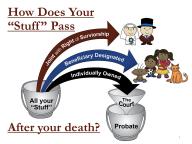|
Tuesday, October 4, 2022
 For many of you, the bulk of the estate ("stuff") that you will be passing on to your loved ones is controlled not by your will, a trust or the probate court, but by the beneficiaries you designated on forms filed with financial institutions. 401(k)'s, IRAs, and Life Insurance policies will be distributed at your death based on whom you have chosen as a beneficiary. Based on my conversations with clients, I'm betting that many of you have not checked those designations in a very long time - if ever. What can happen if you name the wrong beneficiary or No beneficiary?First, let's talk about what may happen if you name no beneficiary. If you do not name a beneficiary for a life insurance policy, after your death an estate will have to be opened to receive the money from that policy. Read more . . .
Monday, October 3, 2022
 If a person dies without a will, they are said to have died “intestate”. When that happens, the person’s assets will be passed to the heirs based on the rules that Georgia’s intestate succession rules. The probate process for a person who is intestate is called an administration and the person named to take care of your estate after your death is called an administrator. The administrator will file a petition in the probate court, and once appointed and sworn in by the judge, the administrator will first pay the debts of the estate and then make distributions to the living heirs of the deceased person. - If you have a spouse but no children, the spouse will get the entire estate;
- If you have children, but no spouse, your children will divide the estate equally.
Read more . . .
Wednesday, September 14, 2022
 Mary, an independent, strong-willed woman all of her life, realized that she might need help managing her finances. She came to me with concerns that her memory might be slipping a little, and she was afraid that she might forget to pay her bills. After assuring her that she was fine, I encouraged her to consider placing her assets in a trust so that she could write her own rules for management of those assets. Mary was skeptical. “Trusts are way too complicated for me! I don’t even know what a trust is. Read more . . .
Tuesday, August 30, 2022
 Mary has several businesses, a real estate partnership with one other person, another business organized as a Limited Liability Company of which she owns 51%, and a third business organized as a corporation which Mary owns 50% of the shares and her brother owns the other 50%. Mary has three children, two are well into adulthood, but her youngest is 17 and will be starting college next year and plans to study medicine after she completes her undergraduate degree. Her oldest child, Lindsey, has been working in Mary’s LLC for several years, and has expressed interest in becoming an owner at some point in the future. The other adult child, Hunter, has no interest in working in any of the businesses.
As a single mother, Mary is concerned about what will happen to her businesses because they are her main source of income and her largest assets. Read more . . .
Wednesday, June 8, 2022
Most parents are conflicted when their children reach their 18th birthday. For many families, that means their child will soon be leaving home for college, a new job, or the military. For parents of children with developmental disabilities, it can be very scary when that child turns 18, because the law presumes an 18-year-old is an adult with the legal rights and responsibilities that come with adulthood. When a child turns18, the parent no longer has the legal authority to make decisions for that child. Joshua, a good-looking young man with a developmental disability, turned 18 six months ago. Read more . . .
Wednesday, June 8, 2022
Phew! I’ve reached that point in life where I can relax – not much, but a little- because both of my children are adults and, for the most part, out of the nest. Until just a couple of years ago, I broke out in a sweat every time I had to go out of town on business by myself. Not only did I worry about whether my kids would get fed, get their homework done and make it to soccer practice on time, but I also worried about what would happen to them if I had an accident and didn’t make it home. If you have minor children, children under the age of 18, I’m sure you worry about that, too. If you are not around, who will feed them, help them with their homework and get them to soccer practice? Choosing someone to care for your children is difficult. Read more . . .
Wednesday, February 10, 2021
 What should you do when a loved one dies? How and when does the estate get administered? Administration is defined as Court-supervised distribution of an estate during probate. Also used to describe distribution process for a trust. Probate means proving the will, but it can also be used to indicate a court process to handle a deceased person’s estate. When a loved one dies, there is often confusion and panic about what legal and financial steps should be taken by survivors. There may be little information about the finances of the decedent, and spouses or children are left to sort through what may seem like a never-ending mass of papers. Read more . . .
Tuesday, March 17, 2020
 As I write this, there have been two cases of COVID-19 identified in the Atlanta, Georgia area. One of the victims recently returned from a business trip to Milan, Italy, where the outbreak of COVID-19 has reached over 2500 cases. The death toll in the U.S. as of the morning of March 4, 2020, is 9, and the number of identified cases is more than 100. Read more . . .
Thursday, June 1, 2017
 What exactly is a guardian, what is a conservator and when should you become the guardian or conservator of an adult?Aunt Mary is 86 years old and has always been a little eccentric, but lately she’s been giving money to John, a much younger man that she calls her special friend. Aunt Mary says that she knows her family doesn’t approve of her giving him money and gifts, but she has plenty of money, John has been her friend for many years, he has always helped her with her home and yard, and she doesn’t have anyone else she would rather spend her money on. Does she need a guardian or conservator? What is a guardian and conservator? A guardian is a person who is legally responsible for someone who is not able to manage his or her own affairs. Guardians and conservators are appointed by the judge of the probate court in the county in which the person in need of a guardian/conservator, called a ward, resides or can be found. In Georgia, a guardian is the term that is used for the person responsible for managing affairs related to the health and safety of the ward, while a conservator is responsible for the financial affairs of the ward. Read more . . .
Thursday, August 6, 2015
 How do we decide how we want to be treated at the end of life? What would a good day look like if you were suffering from a terminal illness? This is one of the questions Dr. Atul Gawande asks in Being Mortal, Medicine and What Matters in the End, New York: Metropolitan Books, Henry Holt and Company, 2014, his book exploring medical treatment at the end of life. Dr. Gawande looks at how this one question, along with a series of questions most physicians are not asking their patients, might shape the course of medical treatment and care of those who are terminally ill, as well as those frail elderly who are in need of long term care. In the book, one patient says that he is willing to have medical treatment for his terminal illness so long as the treatment will allow him to eat ice cream and watch football on television. Read more . . .
Monday, June 30, 2014
Steve, a veteran who receives service-connected compensation for ALS, amyotrophic lateral sclerosis, often known as Lou Gehrig’s disease, has trouble walking up the stairs and it is getting increasingly difficult for him to get in to the bathtub. His wife, Jane, can no longer lift him into the tub.
Steve may be eligible for a grant from the VA to adapt his house to accommodate his disability. The VA provides grants to Service members and Veterans who have total service-connected disabilities to help modify a home, purchase an already adapted home, build an adapted home on land already acquired, or pay down the unpaid principal on the mortgage of an adapted home the Service member or Veterans has already acquired.
There are two types of grants, with unfortunately similar acronyms: the Specially Adapted Housing (SAH) Grant, which provides up to $67,555 or the Special Housing Adaptation (SHA) Grant, which provides a maximum of $13,511 in 2014. Read more . . .
The Elrod-Hill Law Firm,LLC assists clients with Estate Planning, Veterans Benefits, Medicaid, Elder Care Law, Probate, Special Needs Planning and Pet Trusts in the North Atlanta area including the counties of Dekalb, Gwinnett and Fulton.
|

|
|
|